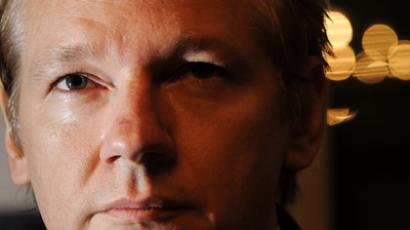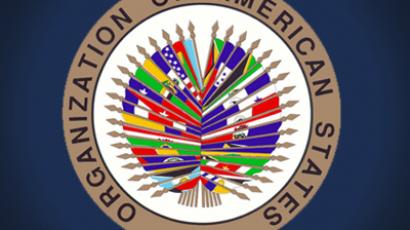US war on whistleblowers must end - Assange (VIDEO)
Julian Assange has made his first public appearance in the two months since he took refuge at the Ecuadorian embassy in London.
He thanked the hundreds of people gathered outside the embassy for their support, claiming it was their resolve and presence that stopped British police from storming the building. "On Wednesday night, after a threat was sent to this embassy and police desceneded on this building, you came out in the middle of the night to watch over it, and you brought the worlds eyes with you. Inside this embassy after dark I could hear teams of police swarming up into the building through the internal fire escape," Assange said. "But I knew there'd be witnesses. And that was because of you." The WikiLeaks founder also thanked Ecuadorian President Raphael Correa "for the courage he has shown" in granting him asylum, as well as other nations and individuals who support Correa's decision. Assange then slammed the US government and President Barack Obama, calling for an end to the "witch hunt against WikiLeaks.""The United States must pledge before the world will not pursue journalists for shining light on the secret crimes of the powerful. The US administration’s war against whistleblowers must end," he said.He also spoke on Bradley Manning, the Army Private who was slapped with 22 criminal charges for his alleged role in leaking intelligence documents to WikiLeaks, which were then made publicly available on the Internet. Manning has been imprisoned for more than 800 days in pre-trial detention, and has yet to be brought before a military tribunal. "On Wednesday, Bradley spent his 815th day of detention without trial. The legal maximum is 120 days," Assange said. "If Bradley Manning did as he is accused, he is a hero and invaluable to all of us. Bradley Manning must be released." In his remarks, Assange mentioned jailed Bahraini human rights activists Nabeel Rajab, who had recently been sentenced to six months in prison for tweeting comments critical of the Bahraini Prime Minister, calling for him to step down. On August 16, a Bahraini court ruled to extend his sentence by another three years, for “involvement in illegal practices and inciting gatherings and calling for unauthorized marches through social networking sites,” and for his “participation in an illegal assembly” and “participation in an illegal gathering and calling for a march without prior notification.”Prior to his arrest, Rajab appeared as a guest on episode four of RT's ‘The Julian Assange Show,' hosted by the WikiLeaks founder. In the interview, he criticized the US-led invasion of Iraq, as well as US refusals to take action during the Bahraini protests and the wider Arab Spring.Assange likened himself to Russian punk band Pussy Riot, which recently had three members sentenced to two years in prison for its 'punk prayer' in Moscow’s Christ the Savior Cathedral. "There is unity in the oppression," Assange said. "There must be absolute unity and determination in the response" The WikiLeaks founder was granted political asylum by Ecuador on Thursday – a decision that ignited a wave of international response, with the UK and Sweden opposing the verdict and Latin American countries strongly supporting Ecuador’s move. ‘Assange case part of long history of whistleblower-smearing’Political activist Craig Murray, a former UK ambassador whose writings implicated the CIA and MI6 in using evidence obtained through torture, claimed the allegations of sexual assault against Assange are the latest incident in a history of dubious charges leveled against whistleblowers. “Unfortunately, there’s a long history of whistleblowers being smeared and charged with crimes unrelated to their whistleblowing, because, obviously, it’s quite difficult for states to convict people for telling the truth about state misdemeanors,” he told RT. “So what you do is you frame them with other charges, very often sexual charges because that destroys the person’s reputation.”Murray pointed to the charges he faced for allegedly extorting sexual favors in exchange for visas during his tenure as ambassador to Uzbekistan, shortly after he blew the whistle on US- and UK-led torture programs. “And I am by no means the only one. Janis Karpinsky, who blew the whistle on Donald Rumsfeld’s sanctioning of torture at Abu Ghraib, was charged with shoplifting, for example. There are many such examples,” he said.Murray also argued that British Foreign Secretary William Hague embarrassed himself by ordering the sending of a letter that threatened to revoke the Ecuadorian embassy's diplomatic immunity, simply so that UK authorities could arrest Assange. “He once gave an interview in which he said that as a student, he used to drink 14 pints of beer a day,” Murray said. “I think he must have drunk 28 pints before coming up with the threat to storm the Ecuadorian embassy.”














